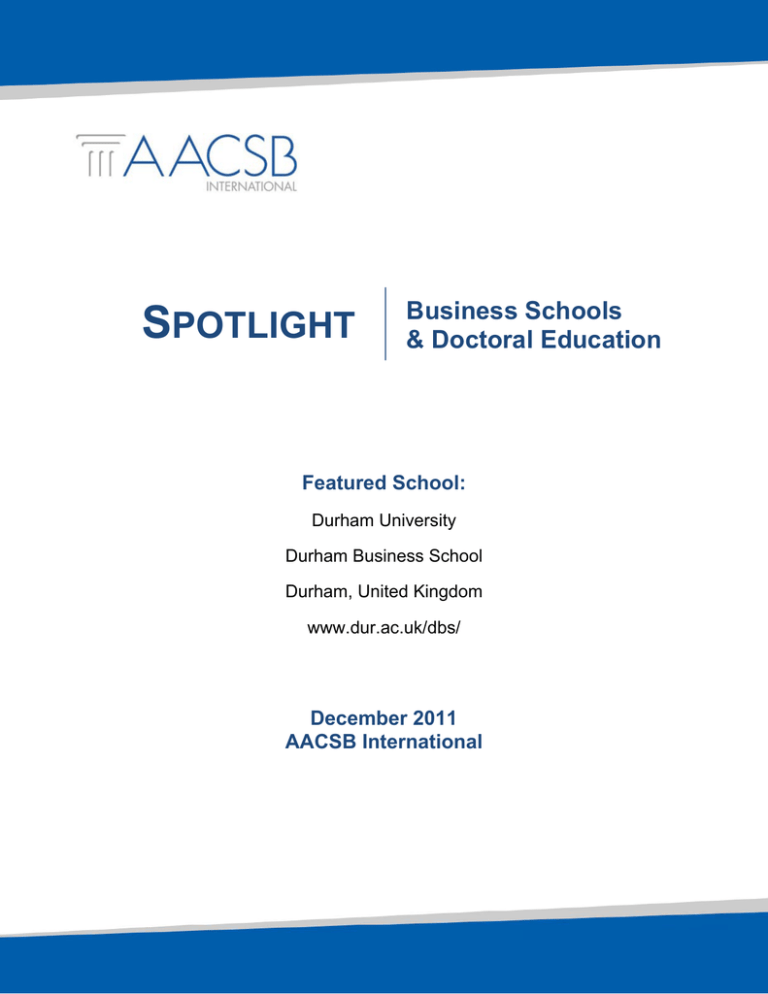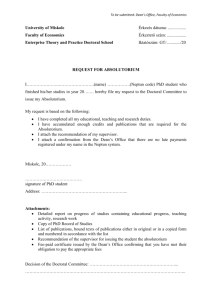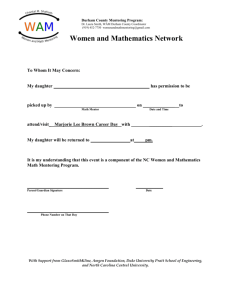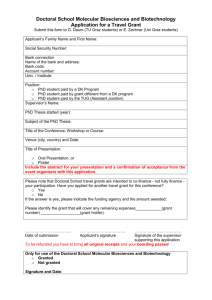
SPOTLIGHT
Business Schools
& Doctoral Education
Featured School:
Durham University
Durham Business School
Durham, United Kingdom
www.dur.ac.uk/dbs/
December 2011
AACSB International
SPOTLIGHT | Business Schools & Doctoral Education
Durham Business School | 2
Durham Business School PhD in Management Program
The PhD Program has a long history at Durham Business School (DBS), but in the last decade has seen
considerable growth in the number of students and faculty, as well as in the scope of research areas
available to students. The majority of current DBS faculty members supervise at least one doctoral
student. This high level of involvement with doctoral education helps to cultivate a supportive and
engaged research community – something that students and faculty alike view as a highlight of the DBS
PhD Program. The School encourages and nurtures a collaborative supervisor-candidate relationship,
which has resulted in “high completion results and positive thesis examinations by students,” according to
Dr. Peter Hamilton, Director of the PhD Program and Senior Lecturer in Human Resources Management.
Student- Supervisor Collaboration
This “relationship” begins at the time of students’ application to the PhD Program. In addition to
demonstrating that they have met the prerequisite of having been awarded an appropriate Masters
degree with a research component, students’ applications must include a research proposal for their
thesis. The research proposal is expected to be about 1500 words and is a major deciding factor for
granting admission to the program. The general subject of the proposed research must align with at least
one member of the School’s academic staff.1
Prior to completing the online application, applicants are encouraged to contact a relevant member of
academic staff to discuss the research proposal, and potentially secure a commitment to serve as a
primary supervisor. According to Dr. Hamilton, about half of applicants reach out to potential supervisors
in this way. The remainder are considered “cold applications,” and these research proposals are reviewed
by the admissions team. Subsequently, relevant members of staff are contacted, and invited to review the
proposal to decide if they are interested in working with the student. In a few instances, such as when a
professor has a grant and is in search of a student to aid in the research, PhD scholarships are
advertised and students apply to fill that research role.
Throughout the program, students work with a dual supervisor team, consisting of a primary and
secondary supervisor. For a member of academic staff to be a primary supervisor, he or she must fulfill
four criteria:
1. Hold a PhD degree
2. Be research-active
3. Be an expert in the subject of the student’s research
4. Have previously supervised a doctoral student
© AACSB International. All Rights Reserved.
SPOTLIGHT | Business Schools & Doctoral Education
Durham Business School | 3
Faculty members who have never before supervised a doctoral student can gain supervisory experience
by initially serving as a secondary supervisor. To fill this role, the faculty member will normally hold a PhD
degree and be research active, and should have strong general knowledge relevant to the student’s
research subject.
Program Structure
The full- time program generally takes three years to complete and, although a part-time option (ranging
from five to six years to complete) is available to students, only a few are enrolled on a part-time basis.
This is largely because the school also offers a Doctorate in Business Administration (DBA) program– a
more structured part-time program with taught modules in the first two years that tends to be more
appealing to students who are interested in working simultaneously.
As is common in the UK, the DBS PhD program centers on the thesis, with no taught, subject-based
modules such as typically seen in the United States. Instead, students participate in a series of
departmental and faculty workshops covering areas related to research, including conducting qualitative
research, the use of software programs such as SPSS, or quantitative analysis.
The thesis counts as the final grade for the students’ entire doctoral program. Expected to make a
significant and original contribution to knowledge, the output may take the form of a single bounded work.
Although students are not expected to have published any other articles prior to completion of the
program, the expectation is that the final thesis content should be able to support between 2-4
publishable papers. A typical thesis at DBS ranges from 80,000-100,000 words. Students are required to
defend their thesis at an oral examination normally conducted by two examiners, usually one internal
(independent of the work on the thesis) and one external to the University.2
Supporting Students
Due to the structure of the program, the student-supervisor relationship is a very important one, and one
that the business school prides itself on cultivating. Additionally, the school aims to create a supportive
environment for doctoral students in several other ways. Throughout the program, for example, students
have opportunities to develop skills to help their research and to enhance their life skills and
employability.3 On beginning the program, students complete an individual training needs analysis. Some
of these needs are fulfilled through the University’s Doctoral Training Program, which provides courses
relevant to students’ professional development and is intended to complement the discipline-specific
training offered by the Business School. This training is open to all doctoral students in the social
sciences, and covers general topics such as research methods or effectively managing a doctoral
© AACSB International. All Rights Reserved.
SPOTLIGHT | Business Schools & Doctoral Education
Durham Business School | 4
supervisor. More discipline-specific training, e.g., the application of quantitative analysis in finance, is
typically provided by the supervisor.
If the necessary skills training is not available at Durham University, the Business School will endeavor to
fund the student to pursue a course or seminar at another institution. This collaborative approach,
particularly for students funded through Economic and Social Research Council (ESRC) grants, has been
encouraged by the UK government through some recent higher education reforms; for example, DBS and
Newcastle University collaborate to provide training, in their respective areas of strength, to each others’
doctoral students.
Hamilton estimates that just over half of the students are funded from a variety of sources, while the rest
are self-funded. All students are eligible for applying for University scholarships. Hamilton stresses that
Durham University does not regard the PhD program as a “cash generating program, but rather as a
critical link to the University’s research strategy.” The University thus encourages students to attend
international conferences to gain experience and to develop their research networks, and DBS often
provides funding to help them do so.
PhD students have the opportunity to teach at the University, and those that do are compensated. In
order to teach, students (typically in their second year) must complete an application form and present a
mock seminar that is judged by a panel of three academics as a way of ensuring the individual is capable
of teaching a classroom of students. Those who do secure seminar teaching roles are mentored and
advised by a faculty member to assist in the development of their teaching skills.
After Graduation, Securing a Teaching Certificate
A unique feature of higher education in the UK is that all academic staff must complete a teaching
qualification. New academic staff who have recently completed their PhD join DBS on a three-year
probationary period, during which time they complete the University teaching certificate (the Durham
University Learning and Teaching Award, or DULTA4). The mandatory, structured program enables the
new faculty member to develop a portfolio around teaching, and individuals in the probationary period
have a reduced teaching workload to accommodate their participation in this program.
At DBS, the small number of part-time doctoral students who are also working as teaching assistants
have the possibility of participating in the teaching certificate program while pursuing their doctorate,
though full time students are unlikely to have the time, and will not receive the necessary funding, to do
so.
© AACSB International. All Rights Reserved.
SPOTLIGHT | Business Schools & Doctoral Education
Durham Business School | 5
Recognition
Durham Business School’s various student and research-centric activities have been recognized by
awards, such as the 2009 Outstanding Support for Early Career Researchers award by the Times Higher
Education magazine, which praised the school for equipping doctoral candidates with the necessary skills
that would allow them to enter a wide range of future careers and make significant contributions.5 And
according to Dr. Hamilton, student satisfaction is high.
Acknowledgements: AACSB International is grateful for the assistance of Dr. Peter Hamilton, Director of
the PhD Program and Senior Lecturer in Human Resources Management at Durham Business School.
© AACSB International. All Rights Reserved.
SPOTLIGHT | Business Schools & Doctoral Education
Durham Business School | 6
End Notes
1
Durham Business School (2011). Entry Requirements and Application webpage. Electronic document, http://www.dur.ac.uk/dbs/degrees/research/dba/applying/, accessed September 9, 2011. 2
Durham Business School (2011). Programme Structure webpage. Electronic document, http://www.dur.ac.uk/dbs/degrees/research/structure/, accessed on September 5, 2011. 3
Durham Business School (2011). Doctoral Training for Research Students webpage. Electronic document, http://www.dur.ac.uk/dbs/degrees/research/structure/training/, accessed on September 9, 2011. 4
Durham University (2011). Durham University Learning and Teaching Award (DULTA) webpage. Electronic document, http://www.dur.ac.uk/graduate.school/staff/dulta/, accessed September 9, 2011. 5
Durham Business School (2011). “University Wins National Award for Supporting Young Researchers” webpage. Electronic document, http://www.dur.ac.uk/news/newsitem/?itemno=8889, accessed on October 3, 2011. © AACSB International. All Rights Reserved.






